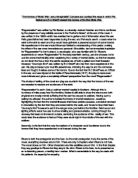Cold War Literature - the particular ways of thinking present throughout the Cold War period largely influenced the composition of The Spy Who Came in from the Cold, Waiting for Godot, and Red Alert.
Significant texts in any period arise from particular ways of thinking and possess an enduring relevance.
Write an essay in which you explore the extent to which this is true of the texts you have studied in your elective.
In your response, refer to TWO prescribed texts AND texts of your own choosing.
The period of Cold War literature dating from the second half of the twentieth century is distinctly seen as a time of enduring relevance; marked with a deep moral questioning of morality and the institution, a heightened sense of paranoia, as well as with a firm shattering of religious persuasion. Significant texts arise from particular ways of thinking to reflect both a societal loss of innocence and social naivety, presenting a widely pessimistic picture of a civilisation awaiting imminent annihilation. A strong reaction to the context of After the Bomb, which created a sense of fragmentation and social alienation, the Cold War texts of The Spy Who Came in From the Cold by John Le Carre, Waiting for Godot by Samuel Beckett, and Peter Georges’ Red Alert all arise from particular ways of thinking evident in the philosophical, religious, economic and technological paradigms of the period and thus they possess an enduring relevance.
The questions surrounding both the reasoning and necessity of the dropping of two atomic bombs on Hiroshima and Nagasaki arguably surround the most significant moral debate of the twentieth century and it is in this context, that George’s Red Alert and The Spy Who Came in From the Cold by Le Carre, explore the philosophical reasonings of morality. The Spy who came in From the Cold raises such concerns as it shatters illusions of the previously perceived 'noble cause'. This is evidenced as Control briefs Leamus when he rationalises that “the ethic of our work... we do disagreeable things… we are defensive”. This not only causes the reader to question the “ethic” of intelligence operations but also to compare the actions of both the East and the West throughout the novel. Additionally the emphasis of the italicised “defensive” highlights the belief that such operations cause concern, as the manipulation and deception of others by the Circus causes the readers to weigh up the “ethics”. This is highlighted especially as it becomes apparent that the British are instigating the protection of a former Nazi, another scenario raising concerns of morality. Control then says that “intelligence work has one moral law – it is justified by results”. Control, as suggested by his title, hold considerable power which The use of “law” suggests a concrete framework of standards and expectations, which is not only unrealistic within an intelligence setting, but also a complete untruth, Control having just said that they are “defensive”. Additionally the issue of amorality surfaces within the conversation between Control and Leamus as the reader questions whether the “results” justify the means. Likewise, when Fielder interrogates Leamus there is a discussion about philosophical and ideological beliefs of British and East German intelligence agents. Fielder believes in that “the whole is more important than the individual”. This statement, explicit and direct, emphasises options of morality for both. Similarly, perhaps as a justification, it is also said that “it is expedient that one man should die for the benefit of many”. Apart from a criticising intelligence work, Le Carre also questions both the direction and morality/amorality of humanity itself. Through the use of “benefit”, the reader is forced to ask if any death is a “benefit” to society, allowing contextual components to come into play. Similarly, George’s Red Alert as a text is characterised by intensified questioning of humanity and human values. The sustained metaphor likening General Quinten to the mongoose who kills the snake from Rudyard Kipling’s Rikki Tikki Tavi spans most of the novel. The juxtaposition of Rikki Tikki Tavi with General Quinten highlights the debate surrounding “aggression for self-defence”, which juxtaposes both scenarios in irony. Another philosophical facet of Red Alert is the validity and morality of the institution. This is a particularly potent issue shown through the rare satirical undercurrent of the Pentagon War Room. Satire is used by George throughout the meetings of “big bomb diplomacy” as leaders from East and West throw around moral questions of whether there is a difference in killing “thirty millions or sixty millions”. This, in addition to the granting of permission to destroy an un-evacuated Atlantic city so that “few would have to suffer for the sake of many” highlights contempt for political institutions making decisions for the world, who through the use of alliteration are “powerless to prevent”. This also relates to Fiedler’s belief in that it is “expedient that one man should die for the benefit of many”. Thus through the questioning of morality in Cold War society, both Le Carre and George, present texts which both depict highly differing perspectives of their surrounding world and which are, to a large extent shaped by the particular ways of thinking present at the time. Thus both texts possess an enduring relevance through the challenging of ideas such as morality and the presence of seeming amorality.








